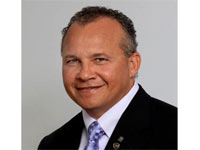
An outspoken Realtor who recently urged a reduction in stamp tax, pleading that 12% of nothing is nothing today applauded government’s intention to roll back the one-time fee on residential property transactions from 12% to 10% and to place a cap on annual property taxes.
Mario Carey, founder of Mario Carey Realty, went further, asking government to consider extending the reversal of the 2% stamp tax increase to all property transactions.
“It’s great that government has announced its intentions to roll back the stamp tax on high end properties from 12% to 10%,” said Carey. “That move will make The Bahamas more competitive in the luxury market, which is important, but I encourage government to go further and reduce all stamp tax on residential transactions by 2% to give middle income families the same advantage and incentive as high-end purchasers.” The stamp tax –a sliding scale recording fee starting at 6% paid at time of purchase — and started at 4% before the increase. Carey suggests a sliding scale roll back to that percentage.
He also believes that constant manipulation of taxes related to commercial and residential property sale and ownership has stirred up more confusion than comfort and left many in the market wondering whether purchasing land, home or business in The Bahamas was opening them up to unknown fees and taxes ahead.
“The opportunity is ripe for the government to be decisive, aggressive and demonstrate its commitment to make economic growth a top priority so everyone at every level of the financial spectrum benefits,” said Carey who wasted no time lauding the initial announcement.
“The initial announcement of turning back the clock on the property transaction stamp tax from 12% to 10% is excellent news for a country whose national debt exceeds $4 billion, whose unemployment is near 16%, who has seen its middle class shrink and those living in poverty increase in epidemic proportions. It is a positive change in the right direction and I just hope that it is enough of a policy change to jumpstart the real estate market because studies consistently show and continually reinforce the reality that a country’s economy is tied to the success and activity of its real estate sector.”
According to Carey, a solid real estate sector helps buffer against poverty, boosts employment and enhances the sense of community and responsibility. Early warnings of poverty, long before empty bellies make stealing food in a rich society a reality, he said, are a sagging lackluster market with more for sale signs than moving trucks pulling in, with foreclosures invading like cancer and demand for short-term rentals increasing.
Carey called for creation of a Bahamas real estate advisory group (BRAG),made up of economists, real estate professionals, legal experts and visiting or rotating international advisors, an organization he suggests that would have high-level round table discussions on the current economic crisis with a focus on the real estate sector.
“There are so many opportunities using a variety of economic policies and tools that can be used immediately and planned for future generations of owners and I don’t think we have begun to explore many of those within our reach,” says Carey. “But affordable stamp tax, building materials duties and property taxes would open up a world that is just out there waiting to be tapped into and developed in a way that is friendly to the environment, helpful to the economy and beneficial to the social well-being of a community.”
In Part 2, Carey explores one market he says is waiting to be tapped.
Diane Phillips & Associates


